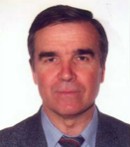|
Plenary
Lecture
Breast cancer is not a primary tumor but a metastasis

Prof. Gaspar Banfalvi
University of Debrecen
Department of Microbial Biotechnology and Cell Biology
HUNGARY
E-mail:
bgaspar@delfin.klte.hu
Abstract: The historical perspective and the
treatment of breast cancer are the oldest indications of
its metastatic origin. The experimental background of
the metastatic view comes from our chemically induced
rat renal nephroblastoma and liver hepatocarcinoma
tumors. The implantation of tumor cells of cell lines
established from these primary tumors resulted in a
kidney capsule – parathymic lymph node (PTN) metastasis
model. India ink implantation also proved the lymphatic
connection between the primary tumor of the kidney and
PTNs. 18F-FDG glucose analog distribution in different
organs provided evidence that the primary sites of tumor
progression are PTNs. Tumor growth was also followed by
staining sections of biopsies of normal, tumorous
kidneys and PTNs. Tumor invasion turned to disruptions
in the renal tissue, releasing cancer cells into the
peritoneal cavity. Transdiaphragmatic channels drained
tumor cells into thoracal lymphatics entering anterior
mammary and parathymic lymph nodes. The kidney capsule-PTN
complex is reflecting a so far unknown mechanism of
tumor development and contributes to the understanding
of tumor development in mammary lymph nodes. The model
provides a reasonable explanation for breast cancer
formation, that is viewed as a metastasis, rather than a
primary tumor.
Brief biography of the speaker:
Gaspar Banfalvi has
received his MS and PhD degrees from the School of
Medicine, Szeged, Hungary, his D.Sc. from the Institute
of Medical Chemistry, Semmelweis University Medical
School, Budapest (1989), Venia Legendi in Biology at the
University of Science, Szeged (1994), and Venia legendi
in Medicine at the Semmelweis University, Budapest,1994.
He has worked as Visiting Scientist and Associate
Professor at Harvard Medical School, Boston, MA
(1983-84, 1987-88) and Harvard University, Cambridge, MA
(1994) on discontinuous DNA replication. At the Leiden
University he was visualizing individual replicons by
fluorescent immunfluorescent staining and confocal
microscopy. He was a research faculty at the National
Center for Toxicological Research working on replication
and repair checkpoints (1996), as Meyerhof Visiting
Professor in the Weizmann Institute, Rehovot, Israel
doing research on base excision repair and chromatin
condensation. In the first semester of the 2003/2004
academic year as a Visting Professor he was lecturer at
the Teikyo University, Maastricht, the Netherlands. In
2000 as a professor he moved to Debrecen University.
Recently he is working at the Department of Microbial
Biotechnology and Cell Biology. His research involves
permeabilization and regeneration of membranes, nucleic
acid structure and function, mechanism of chromatin
condensation, genotoxic effects related to replication,
repair, mutation, apoptosis, malignant transformation.
Recently his group has established several tumor cell
lines after chemical tumor induction and is using the
kidney capsule-parathymic lymph node complex as a
suitable metastatic model.
|
